Whether it’s a creative marketing campaign or scholarship award, knowing how to run an online contest can be an effective way to engage your audience, build brand awareness, and curate quality, user-generated content.
But running online contests isn’t as easy as announcing a big prize and sitting back and waiting for entries to pour in.
In fact, if they’re not run thoughtfully or efficiently, they can be a waste of resources—an event that could in fact harm your brand and your long-term goals.
In this post, learn how to set up and run online contests from start to finish, beginning with goal setting and strategy, and ending with announcing the winner and running analytics.
Follow each step to ensure that your content has two winners: the person you choose and your organization.
The benefits of running an online contest
Yes, online contests are fun and exciting. But if they’re done right, they also serve one or more important goals for the organization running them.
How you’ll benefit from your contest should be top of mind throughout the process—here are just a few common benefits that have made contests popular marketing campaigns and events in the past:
- Build brand awareness
- Boost engagement and interest
- Increase social media followers
- Increase website traffic
- Grow your email list
- Grow your leads
- Associate your brand with winners and top performers
- Create and strengthen partnerships
- Collect user-generated content
- Collect information about your audience
- Gain insight into your products or services, such as customer reviews or suggestions.
- Create buzz surrounding a new product or service
- Help increase sales and your bottom line
Just remember: these benefits don’t automatically materialize when you decide to run a contest. They come with running a contest the right way and with your goals in mind.
Your step-by-step guide: How to run an online contest
Whether you’re running a simple social media contest or conducting a national search for the next big name in filmmaking, your contest process is still going to have the same basic progression of steps in order to make it a success.
Depending on the structure and goals of your contest, you may need to focus more heavily on some steps rather than others, but most everyone will need to do some work on each step before moving on to the next. Let’s take a closer look.
Step 1: Determine your goals and objectives
Take another look at the list of contest benefits above. Does one stick out to you? Or perhaps two or three?
While contests are wonderful things, that’s not the reason that organizations run them. While the public benefits from a challenge, an event, and a competition, your company will benefit in other concrete ways.
First and foremost, your contest goals should reflect your business goals.
- Are you looking for more exposure to your brand, products and services?
- Do you need to expand your presence on social media?
- Are you trying to establish an email list?
- Do you need content, but don’t have a huge budget to buy it?
It’s a good idea to start with a primary goal—and then perhaps consider a few secondary goals.
For example, your primary goal may be to create buzz around a new product, which you’ll also be giving away as your grand prize.
But you could have a couple of secondary goals, like collecting information about what people think about your new product and growing your email list for a drip campaign for your new product.
Knowing these goals before you begin will ensure that you take steps to achieve them, like adding survey questions to your entry form.

Step 2: Set a budget
The ultimate goal of most contests is to improve your bottom line. With that in mind, it’s imperative to budget for your contest carefully, so that your outcome is worth the costs.
While all contests are different, you should think about the following budget items when in the planning stage:
- The prize or prizes
- Your contest management software
- Your website or landing page
- Marketing and advertising costs
- Copywriting and design costs
- Legal costs
- Customer service costs
- Administrative hours collecting and reviewing applications
- Administrative hours analyzing and reporting on results
There are tons of ways to keep your contest economical if your budget is looking bigger than you planned.
Using comprehensive contest management software can cut back significantly on administrative costs. For example, Submittable provides customizable, ready-to-launch landing pages for your contests, so you can save big on costly web design and branding.
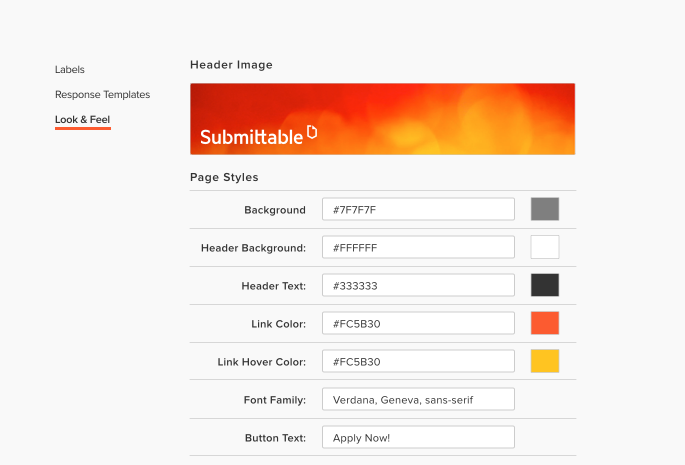
Step 3: Choose your contest timeline
Choosing a workable and appropriate timeline for your contest is critical.
A contest that goes on for too long can lose excitement and be expensive to promote. But a contest that’s too short might result in too few entries or leave contestants without enough time to work on their project for entry.
The solution? Find a balance between duration and urgency.
Create your timeline based on the user’s investment: It takes much less effort and time to take a photo than it does to write a book.
A giveaway or sweepstakes doesn’t take any time besides clicking a few buttons and entering some information, and social media contests are just as fast—but a scholarship that requires an essay, transcripts, and other paperwork requires time and effort.
Finally, don’t just think about this isolated contest’s timeline. Will this type of contest repeat weekly, monthly, or annually in the future? Will there be enough time between contests to give your audience a rest and create a sense of excitement for the next one? Will there be enough time between contests for you to analyze data and use the information and content you’ve collected to your advantage?
Step 4: Build your contest framework
Do you want to run an award, contest, a giveaway, or a promotion? These words aren’t exactly synonymous—and the one you choose should make the most sense with the goals you’re working toward.
An award is often based on merit, and winning one requires that the contestant proves they deserve recognition through submitting an application or project.
A contest is also based on merit and often involves a competition that determines who has done the best job at the task at hand. Contests often involve a creative project, like writing a poem or designing a car, but it could also be fun or silly, like best beard or biggest pumpkin.
A giveaway or sweepstakes is often based on luck. Users simply enter their information and hope to win. In these contests, users may just be required to take a simple step, like fill out a survey, use a hashtag, or refer a friend.
A promotional contest is often based on performance or an action—but it is always aiming at spreading awareness of a brand, a product, a service, or a campaign. A promotional contest could ask participants to take a picture of themselves using a product, to write a product’s new jingle, or come up with a brand new flavor of a product.
Within these four categories of contests, there are almost limitless types of variations. Here are just a few:
- Photo or video contests
- Creation of content contests
- Mention or hashtag contests
- Random win contests
- Referral contests
- Caption contests
- Naming contests
- Essay contests
- Public voting contests
One important consideration when deciding on the type of contest that you’d like to run is what you’d like the barrier of entry to be. Do you want anyone anywhere to be able to enter in a matter of minutes? Or are you looking for only the very best sculptures in the city to submit project proposals for a memorial that will be on display for decades to come?
Once you’ve chosen the type of contest that best aligns with your goals, choose an entry method that aligns with your type of contest. For example, a mention or hashtag contest is meant to be run on social media platforms like Facebook, Twitter, or Instagram.
But for a video contest, it makes more sense to use a video contest solution like Submittable that that can accept video file uploads and then display the entries in the gallery.
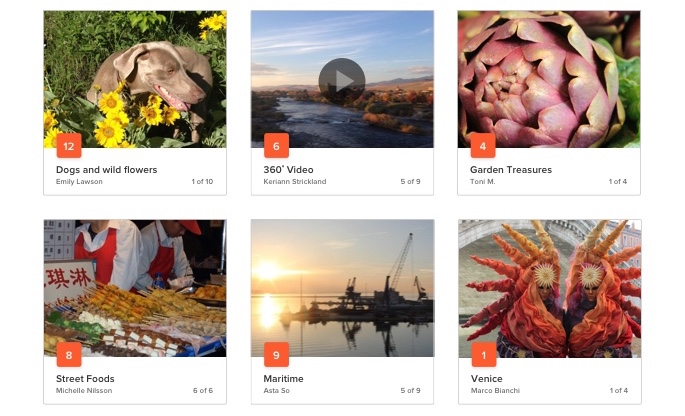
Step 5: Write the rules and guidelines
Having a clear, thorough set of online contest rules and guidelines for your contest is mandatory. If you skip this step, the best outcome is losing credibility with your audience, while the worst outcome is expensive and brand-damaging legal troubles.
The guidelines should explain to a general audience how to enter the contest successfully. A guideline might be how long you suggest their story is, or what your song should be about. Guidelines might also explain exactly how to enter, what the deadline is, and what the prizes are.
The rules are a little more technical. They may cover some of the basic ground that the guidelines do, but they’ll also include all the nitty gritty legal details—like if people from certain regions can’t enter, or if relatives of employees can’t apply, or if you can’t submit more than once.
Here are a few quick tips:
- The guidelines should be easy to read and as short as possible while still being comprehensive. The rules should be available in addition to the guidelines and contain all the fine print that will protect you if something goes wrong.
- Have a lawyer look over your rules to make sure they’re airtight and follow state and federal guidelines for running contests and sweepstakes.
- Understand that having unclear guidelines will result in confused users, wasted customer support time, and more low-quality entries.
- Realize that social media platforms have their own sets of contest guidelines you need to follow if you’re running that kind of contest.
Step 6: Select and secure your prizes
Your prize or award is the primary reason that users will enter your contest. If it’s lacking in any way, you will see fewer entries and fewer quality entries. If it’s great, you’ll see the opposite effect.
The most important step is to pick a prize that’s relevant to your audience and a prize that makes sense for your contest.
What prizes might be great for a wildlife photography contest, for example? A trip to an exotic location (with lots of wildlife), new camera equipment, or money for the winner to start their own photography studio.
Pick a prize that you can get a deal on. Since you’ve already planned your budget a few steps ago, you know how much money you can spend on prizes. But you can make that money go further if you take the time and effort. Consider forming a partnership with another organization, in which you market their prize (maybe it’s a photography equipment company) along with your contest in exchange for a discount. Also consider your own goods and services as a way to not only stay relevant but also to save money.
In addition to a grand prize and possible prizes for runners-up, consider an added incentive just for entering. Get creative— it could be a digital download, a discount code, a free trial, or a piece of swag—because knowing that you get something just for entering can really boost engagement.
And don’t forget: convey the prize’s value. You’re going to spend a hefty chunk of your budget and resources on this big prize, but that goes to waste if you don’t accurately or successfully convey the value of the prize to your audience. If it’s not cash, give it a cash value. Make sure it’s prominently mentioned in all of your marketing materials, too.
Step 7: Define your review process
Choosing the right winner requires having a solid review process. In addition, having a thoughtful review process can save you time, resources, and a lot of headaches.
Here are just a few questions to ask when setting up your review process:
- Who will judge? The public? An internal review panel? Guest judges or reviewers?
- Will parts of the process need to be anonymous—should some information be protected to make it more fair or for privacy reasons?
- Will entries have to be reviewed more than once, or by more than one person?
- Will there be a scoring rubric? Or a yes-or-no decision?
Recognize that if you will have a panel of review judges, they will need to be selected and trained to use any software you’ll be using. In addition, training them in regards to bias/discrimination and good decision-making practices can save you time and lift up your contest in the long run.
Especially if your review team is remote, or even if they’re not, contest software like Submittable that allows for in-platform reviewing makes reviewing a lot easier, more fair, and more efficient.
Important features for the review process include:
- Anonymous review options
- Bias prevention tools
- Options for multiple stages of review
- Five reviewer permission levels
- Easy, customizable scoring options
London Photo Festival, for example, sends a simple gallery link from Submittable to their judges so that they can view the entries from anywhere, on their own timeline—just one of the Submittable tools they use when they run a photo contest.

Want to allow public voting? Submittable offers a gallery view for pictures and videos as well as a number of public voting options.
Looking for the perfect platform for your online contest?
See what Submittable has to offer in this short demo.
Step 8: Create a contest marketing strategy
The more entries you can collect, the more successful your contest will be. Getting the word out, not just to the world, but to your targeted audience, is key.
Create a marketing campaign that is diverse and based on data and insights. Also create a campaign that touches the watering holes where your audience gathers—if your audience is older and less tech savvy, for instance, don’t waste advertising dollars on the newest, freshest social media platform.
Here are a few ideas to get started:
Email campaign. You likely have an email list of people who are interested in who you are and what you do. This is an opportune time to use it. Take the extra time to create great content and design for your email piece.
Blog post. Your blog is another forum where your ideal audience probably visits. It’s also a great place to list all the details and guidelines entrants need aside from the landing page. Blog posts are also great to share on social media.
Social media. If your audience uses it, social media may be one of the best places to spend your marketing budget. Share your landing page and blog posts, share hype videos, and remind your followers of upcoming deadlines. Buy ad space on platforms like Facebook, Twitter, and Instagram to reach an even bigger audience.
Website widget. Add an eye-catching widget or clickable banner to your website homepage that brings visitors to your landing page.
Target specific audiences in forums and communities. If you’re running a photo contest, direct marketing dollars toward advertising in online forums and communities that contain photographers and artists. You can take this strategy offline, too: old school posters hung in places where your audience gathers can be extremely effective depending on the scope of your contest.
Partnerships. Did you partner with another organization for your contest’s prize? Make sure that partnership also includes help with marketing. Having another organization to amplify your voice can be extremely helpful.
Influencers. Influencers on and off the web can also amplify your message. Returning to the photo contest example, you might reach out to a few photographers with large followings to share your contest with their audience—and put in a good word for you.
PPC and other ad buys. Traditional ad buys could be a great option for marketing your contest, depending on your budget and the scope and length of your contest.
Contest promotional sites. There are specific websites that help connect people looking to enter contests with the best current competitions and sweepstakes. Many of these websites focus on contests with low barriers to entry, so if that’s what you’re running, this is a choice option.
Submittable Discover. Submittable’s searchable database of opportunities is used by its large stable of submitters who are looking for contests and competitions to enter. Tag your contest with relevant keywords to make it easy for millions of submitters to find you.
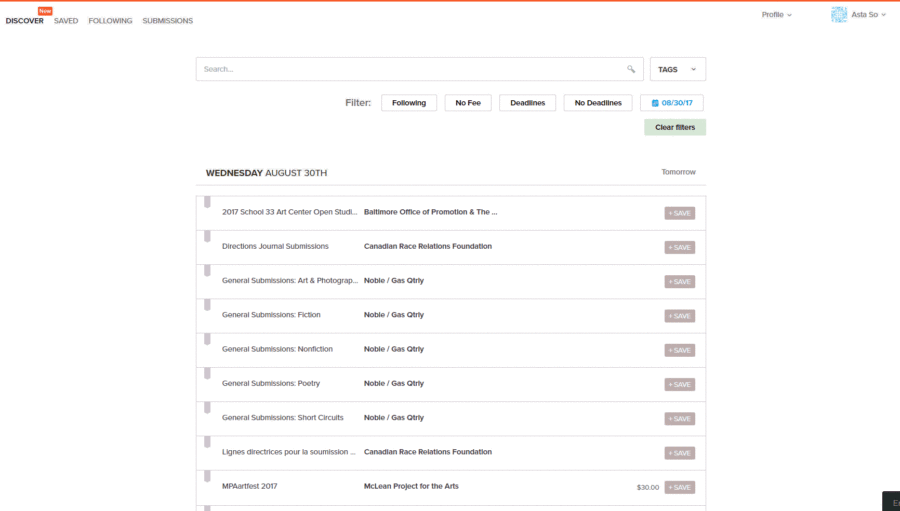
Marketing should be an important part of your budget, but make sure not to put all of your eggs into one basket, like social media or PPC advertising.
Step 9: Set your contest up online
As you take the big step to set up your contest online, keep branding, design, and copy at the forefront of your mind. You want your landing page to match the look and feel of your website and the rest of your assets—and you want the copy and design to lend credibility and excitement to your contest.
Make sure that your landing page includes:
- Guidelines. Your guidelines should be clear and thorough (although also as concise as possible). As your contest begins, don’t hesitate to update your guidelines to answer common questions that are coming in from entrants.
- Rules. This is where you want all of your fine print. Some contests post all the rules on their landing page, while others link to the nitty gritty legal stuff from the landing page. Be sure to familiarize yourself with the laws regarding contests in your jurisdiction.
- Prize. Your landing page should prominently display your prizes—and make their value clear.
- Timeline. Your deadline should also be prominent, and your copy should reflect some sense of urgency to enter. Consider an incentive for entering the contest early, such as a discount code, a waived entry fee, or free swag.
- Call to action. The bottom of your landing page should have a clear button that brings them to the entry form.
Now that you have your landing page, you need to create your entry form.
Submittable’s drag-and-drop form builder allows you to ask just the questions you need from entrants without wasting their time or yours.
[TK form builder screenshot]
A few entry form quick tips:
- Use the branching tool to ask follow-up questions.
- If your contest has different categories, have entrants select their category so that your can automatically label all submissions and organize them in seconds.
- If you ask for demographic or personal information on your form, be sure to note how that information will be used or whether it will be hidden during the selection process.
- Think about what you want your barrier of entry to be: Should anyone be able to enter your contest in a matter of minutes, or do you want only serious competitors with certain experience to be involved?
Don’t forget: make sure that both your landing page and entry form is tablet friendly and mobile friendly—and accessible to all.
Step 10: Choose and announce a winner
If you set up your selection process well in Step 7, choosing a winner should go smoothly and efficiently. Once you have your winners, runners-up, and finalists selected, announce the results across your channels:
- Social media
- Blog post
- Website
- Press release
A good rule of thumb? Announce the winner in any place that you engaged in marketing the contest.
Be sure to inform those who did not win, preferably before the winners are announced.
Submittable allows for in-platform email template creation and personalized bulk notifications, which makes letting everyone know at the same time, and in the same way, easy. It’s also easy to track exactly who’s heard the news and who hasn’t.
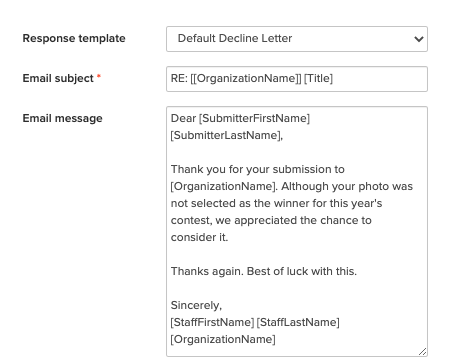
Try to avoid sending a form rejection that isn’t encouraging or informative. Try to Invite them to your next contest, share stats from the contest to show how competitive it was, and involve them in any user-generated content sharing. If you have the ability, offer them something, such as a coupon, a deal, or freebie. Be sure to say thank you to everyone who participated.
Finally, make sure to send out the prize quickly and in full.
Step 11: Use your user-generated content
If one of your goals for your contest was to collect lots of quality user-generated content, now’s the time to organize it and put it to use.
In Submittable, tou can use auto labels to mark entries with great content to return to later.
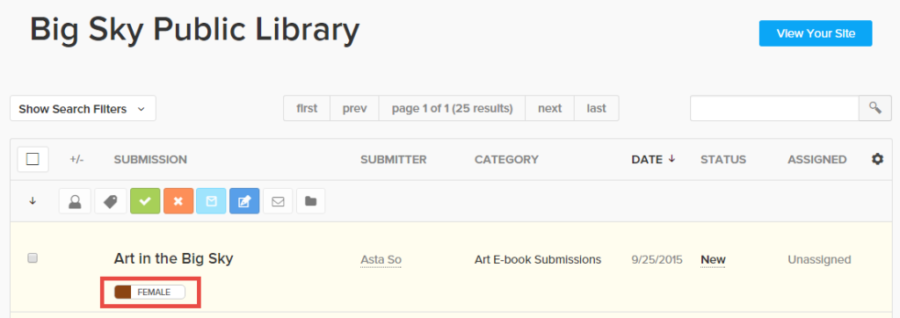
Submittable’s gallery feature is another way to showcase user content, especially if your contest contains visual elements.
You can also ask certain entrants, such as finalists, to upload testimonials or thank you videos to the contest management platform, which you can then edit into videos or use on social media.
The Jeannette Rankin Women’s Scholarship Fund, for example, has scholarship winners upload videos in which they talk about how their lives improved after receiving the scholarship.
Step 12: Track your results
Sure, you’ve announced your winner and utilized your user-generated content. But your contest shouldn’t end there. Tracking your results and analyzing the data you collected from all your entries can be invaluable, especially if you ever plan on running the contest (or another different contest) again.
- Reevaluate your target market
- Look at your spending
- Revisit your goals
- Analyze your demographic data
- Where can you improve?
Submittable’s advanced reporting tools can help you visualize your results, while our integrations can help you get an even bigger picture of the success of your contest.

In addition to tracking your results, you also have a little more cleaning up to do. After the confetti has fallen (and been swept up), be sure to:
- Redirect your landing page
- Turn off your form
- Remove your website widget
- Archive old entries
- Find a home for your user-generated content
- Make sure everyone’s been notified
- Add emails to your subscription list
Manage your contest with care using a contest management platform
Running a contest is exciting, rewarding, and fun. It can also be a boon for your company or organization in multiple ways if you do it right. Contest management software like Submittable can serve as a foundation, guide, and scaffolding for you every step of the way, from setting up your entry form to distributing prizes to your winners.
To learn more about Submittable, watch our demo.